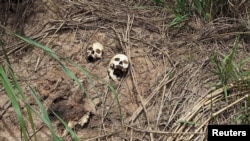In the Democratic Republic of Congo, the United Nations says civilians are paying a high price in the conflict in the central Kasai region. A U.N. report out this week accuses state security forces of killing dozens of women and children.
Since August of last year, the Kasai region in central Congo has been the scene of bloody fighting between the government and an armed group known as Kamwina Nsapu.
Both sides of the conflict have been condemned by the United Nations: the militants for allegedly recruiting children and attacking public buildings and officials; and the security forces for allegedly deploying disproportionate and indiscriminate force in operations against Kamwina Nsapu rebels.
On Tuesday, the U.N.’s Joint Human Rights Office published findings that the Congolese military and police forces carried out at least 185 extra-judicial executions during March and April, including 16 women and 53 children, in just three towns in Kasai-Central Province during operations against the armed group.
Kasai-Central is one of five provinces affected by the fighting.
VOA spoke with José Maria Aranaz, the Joint Human Rights Office’s director.
“We are very worried by the excessive and disproportionate use of force by state actors, particularly military units but also by the police which explains the large number of extra-judicial killings and summary executions,” he said.
Aranaz told VOA that up to 700 civilians may have been killed since the start of the fighting.
The government has denied accusations of abuses against civilians. On Monday, military spokesman General Leon-Richard Kasonga told reporters that the Congolese armed forces "respect international humanitarian law and human rights" and "have operated in a professional manner.”
The U.N.’s Office for the Coordination of Humanitarian Affairs says the crisis in the Kasai region has displaced more than 1.2 million people.
Violence appears to be intensifying. The U.N. says 100,000 civilians were uprooted during the first week of May alone.
In recent months U.N. investigators say they have also found mass graves, reportedly dug by Congolese soldiers after clashes.
“Up until now, 42 of these sites have been documented and reported to the government for their action. The U.N. has offered its support, both operational and technical, for verifying and conducting a credible investigation as to who is responsible for these mass graves. We are still waiting to hear from the authorities about what progress has been made,” said Aranaz.
Congolese civil society activists doubt the government’s capacity to carry out a credible inquiry.
Jean-Claude Katende, the president of the African Association for the Defense of Human Rights, spoke to VOA.
He said that the only possibility for victims to eventually get access to justice is to put in place an international inquest under the U.N. to investigate all these violations of human rights.
General Kasonga, the military spokesman, accused Kamwina Nsapu of digging the mass graves, calling the militiamen “bloodthirsty terrorist insurgents.” He said the military investigation into the mass graves is ongoing.
Kasonga urged militia fighters to lay down their weapons and in March the interior ministry said that 400 had surrendered in the course of a week.





